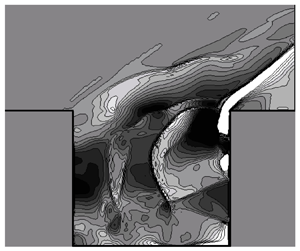Article contents
The exchanges between the mainstream in an open channel and a recirculating flow on its side at large Froude numbers
Published online by Cambridge University Press: 04 June 2021
Abstract

The exchange of tracer mass in shallow waters between the mainstream and a recirculating flow to the side is examined in this paper over a wider range of Froude numbers than in any previous studies. We used a well-calibrated weighted essentially non-oscillatory scheme to capture the shock waves while maintaining the stability of the computation. The radiation of the waves suppressed the turbulence and the entrainment of surrounding fluids into a mixing layer. Shock waves began to form in the recirculating flow at a mainstream Froude number of  $Fr_{o}\simeq 3$. The effect of the shock waves was a sudden increase in lateral mixing between the mainstream and the recirculating flow, leading to a corresponding sharp drop in a retention-time coefficient. These simulation results for the effect of the waves on mixing in shallow waters at large Froude numbers were consistent with the available data obtained from laboratory experiments.
$Fr_{o}\simeq 3$. The effect of the shock waves was a sudden increase in lateral mixing between the mainstream and the recirculating flow, leading to a corresponding sharp drop in a retention-time coefficient. These simulation results for the effect of the waves on mixing in shallow waters at large Froude numbers were consistent with the available data obtained from laboratory experiments.
JFM classification
Information
- Type
- JFM Papers
- Information
- Copyright
- © The Author(s), 2021. Published by Cambridge University Press
References
REFERENCES
- 6
- Cited by


